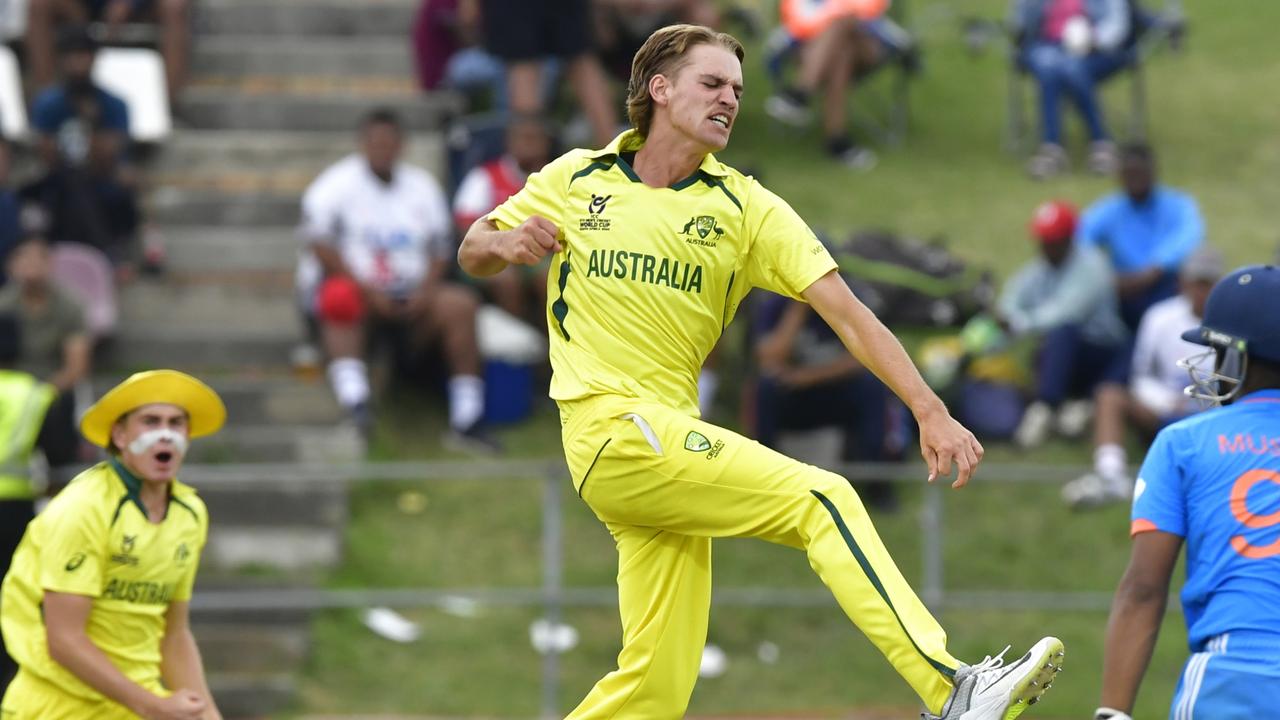Jason Gillespie on Indigenous Test cricketers, Australia Day and the Redbacks
Jason Gillespie, the country’s first and only male Indigenous Test cricketer, has come out swinging on the issue of Australia Day. Read his SA Weekend profile here.
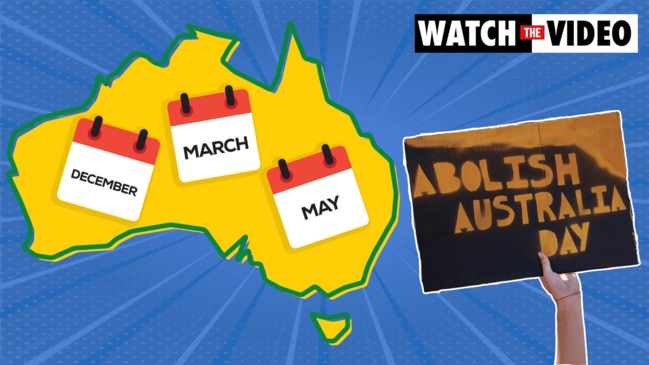
Cricket
Don't miss out on the headlines from Cricket. Followed categories will be added to My News.
The nation’s first and only male Indigenous Test cricketer, Jason Gillespie, believes Australia Day should be moved from January 26 because not ”every single Australian can celebrate that day’’. “The brutal reality is, and whether people like it or not, the defenders of Australia Day, they have got to understand that it is not a day to celebrate for Indigenous Australia,’’ Gillespie tells SA Weekend magazine this weekend. Read the feature story here exclusively.
Jason Gillespie says there’s certainly pride in being Australia’s only male Indigenous Test cricketer, but there’s also disappointment. Disappointment that he’s still the only Indigenous player among the 460 men who have played Test cricket since the first game all the way back in 1877.
“Over the whole history of Test cricket in our country, the 370th cap, was the first Indigenous player,’’ Gillespie says, referring to his own place in that long line up of cricketers. “It’s probably not ideal, is it?’’
It’s not, no, but Gillespie is confident that he’s not going to be first and last.
“At the moment I’m the only Indigenous Test cricketer (but) that will change, there’s no doubt of that,’’ he says.
Gillespie, now 46, is the best-credentialed Test cricketer SA has produced since the 1970s. He played 71 Tests, captured 259 wickets and in the last game of his Australian career this fearsome fast bowler made an improbable 201 not out against Bangladesh. It’s a fact that still delights him.
Now into his second year as coach of the South Australian Redbacks, he is the man charged with turning around the fortunes of a cricket team, notorious for years and decades of failure. It would not be unkind to describe the Redbacks as a laughing stock in national cricket circles and Gillespie says one of his priorities is to bring to an end the “culture of entitlement’’ that has hindered SA cricket for too long.
But as we sit on some white plastic chairs on the boundary of Park 25, watching players on the fringes of the Redbacks try to impress the coach, Gillespie is forthright, not only on the challenges facing SA cricket, but about encouraging more Indigenous cricket participation, racism in sport, the damaging nature of social media and the need to find a new date for Australia Day.

Gillespie has always been proud of his ancestry but the fact of his Indigenous heritage passed unmentioned when he made his Australian debut.
“No one really acknowledged it and I’ll be honest, at the time I was just so excited to represent my country I didn’t even think of anything like that,’’ he says.
It was never a secret. His father Neil worked in Aboriginal legal rights, a field his brother Rob still works in. He traces his heritage to the Kamilaroi people who live in northern New South Wales and southern Queensland. His great-grandfather was a warrior and a painter. On his mother’s side, he traces the family line to the Greek island of Kythara and thinks he still has a few relatives there.
Gillespie is an easy bloke to talk to. He engages with questions and thinks about his answers. When the talk turns to racism in society and sport he appears more flummoxed than angry that racial abuse is still a factor in modern Australia, but there’s an obvious deep well of emotion when he talks about it.
He was overseas coaching in England when the racial vilification of former Sydney Swans player Adam Goodes by tens of thousands of AFL fans was at its height, but the ugly episode still upsets him.
“I think probably the most disappointing thing that I’ve seen in our country in the last decade or so has been the whole Adam Goodes saga,’’ he says. “It’s really disheartening, you know, heartbreaking really, just how a really good, good man, a really good person has to deal with that nonsense.’’
Gillespie has even less time for those who sought to excuse the racist booing of Goodes and those who attributed the phenomenon to something other than the colour of his skin. Pathetic excuses were offered in defence of the booing that Goodes was a dirty player or staged for free kicks.
“It’s junk, it’s nonsense talk. We’ve got to be better. It was really poor. The way he was treated was inexcusable as far as I’m concerned.’’

Gillespie has been subjected to some racist abuse on social media but says it’s nothing compared to what some AFL footballers have been through.
“The guys must be exhausted and tired of the crap,’’ he says. “I really genuinely feel for them and I will always defend them because they haven’t done anything wrong other than have a skin colour that someone thinks is wrong, which is nonsense. It is absolute nonsense.’’
Gillespie says he wrestles with social media. As a vegan for seven years, he knows there is always backlash when he expresses an opinion.
“I just find there’s a lot of really angry people out there in this world,’’ he says.
Which is a shame because he also wants to use social media to reach cricket fans, talk to them directly and give them a “little bit extra’’ that fans may not get through the media.
“It’s more and more questioning what I’m doing. Is it worth it? Is it worth all the nonsense?’’
He also copped backlash when he supported fellow Indigenous cricketer Dan Christian’s view that it was time to change Australia Day from January 26, the day Captain Arthur Phillip landed to begin the colonisation of the continent.
Gillespie makes the point that Australia Day has been celebrated on various dates over the years, not just January 26. Indeed, Australia Day wasn’t even a national public holiday until 1994.
“We could find one (date) that I reckon everyone in Australia could be comfortable with and we can celebrate fully, and every single Australian can celebrate that day,’’ he says. “Because the brutal reality is, and whether people like it or not, the defenders of Australia Day, they have got to understand that it is not a day to celebrate for Indigenous Australia. It simply isn’t and I just wish people would listen and learn and understand exactly why it’s not a day for Indigenous Australia to celebrate.’’
Gillespie says it’s not like we are short of options for another date.
“Take out Christmas, take out New Year take out Easter, take out Anzac Day, maybe take out a couple of other religious holidays that mean a lot to various people. I’m still reckoning there’s over 300 days.’’
Gillespie believes any controversy in shifting the day would blow over quickly, that it’s only a “minority’’ that are welded to January 26.

Cricket has been Gillespie’s great passion as long as he can remember. His hero was the iconic Australian fast bowler Dennis Lillee. Gillespie spent his first 10 years in Sydney and remembers family holidays on the NSW south coast, where he refused to go to the beach because the cricket was on television.
“I just sat in front of TV, I remember so much so that I wouldn’t go and get a drink, or go to the toilet while it was on. It had to be an ad break or drinks break,’’ he says.
“I was hardcore. I couldn’t miss a ball and just completely and utterly fell in love with the game and it probably hasn’t changed too much.’’
When the family moved to SA, Gillespie attended Flagstaff Hill Primary and then Cabra College. He did Year 12 a second time to improve his marks enough to qualify for an Australian studies course at university but it was playing for Australia that was always the ambition.
When his family moved to Canberra in 1993, Gillespie remained in Adelaide to complete school. He knew the ACT had no first-class cricket team and that would stop him playing for Australia. He stayed with a mate and his grandmother, and took a job delivering pizzas.
Gillespie made his South Australian debut in 1995, aged only 19. His third match was that year’s Sheffield Shield final, which the Redbacks comprehensively lost.

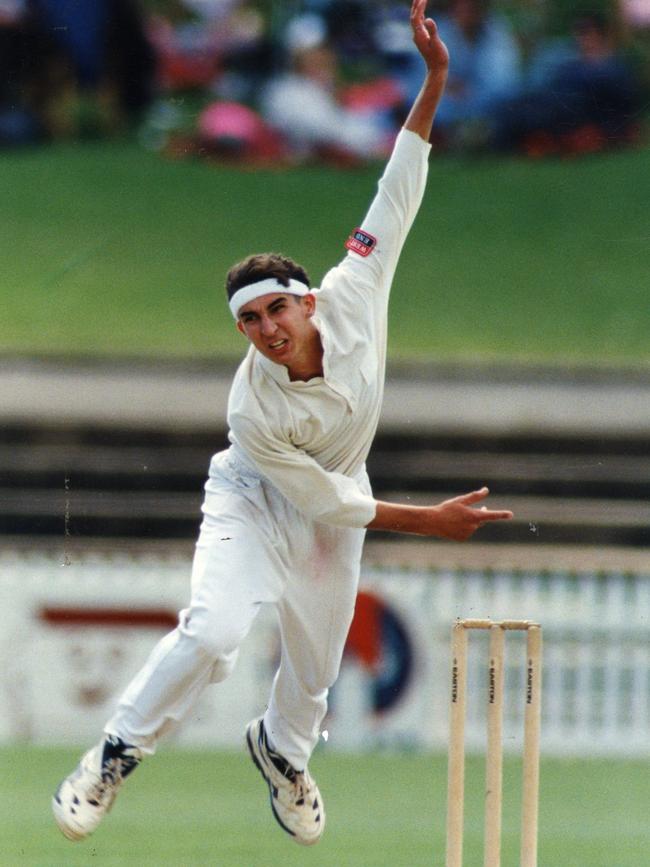
But Gillespie had already been marked as a future star. He had toured India with the Australian under-19 team and was part of the national cricket academy that was based in Adelaide at the time. Although, unlike the other young players, Gillespie did not live at its base at Henley Beach. Shortly after his Shield debut he became a father for the first time and was granted permission to live at home with his daughter Sapphire and now ex-partner. It was a difficult balancing act.
His mum and dad had kept their Adelaide home after moving to Canberra and the new Gillespie family lived there “close to rent-free just to help us get on our feet’’.
“I was really lucky that mum and dad were basically looking after us with the house,’’ he says. But it was still a struggle.
“I was earning a pittance as an Academy player,’’ he says. “It might have been $100 a week. It was bugger all and money was always really tight.’’
However, the childhood dream of playing for Australia was getting ever closer. Gillespie was called up as a late replacement for the injured Craig McDermott for the 1996 one-day world cup. Then in November that year he made his Test debut against the West Indies at the Sydney Cricket Ground. It was a powerful team packed with stars. Mark Taylor was captain, Glenn McGrath and Shane Warne were playing. Ricky Ponting, Mark Waugh and Ian Healy as well.
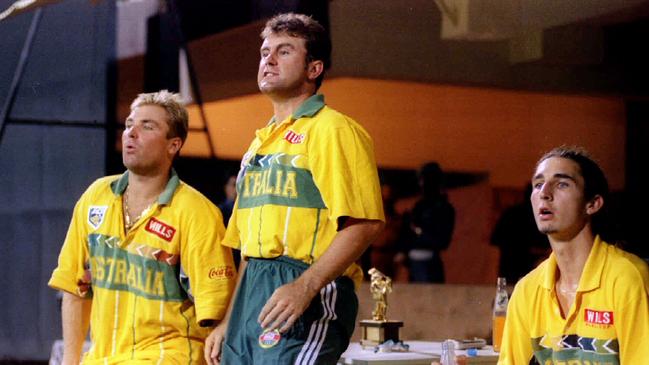
Yet, Gillespie says he didn’t feel intimidated walking into that world.
“This might sound really strange but I always felt very comfortable in the Australian dressing room,’’ he says. “And I can’t put my finger on it.’’
Maybe it was just because he was good at what he did. With McGrath he formed one of the all-time great Australian fast-bowling units and Gillespie played through an era where Australia was the best team in the world.
Not that it was all gravy. Gillespie made multiple comebacks from injuries, including a broken leg when he collided with Steve Waugh while fielding in Sri Lanka in 1999.
His last Test was in Bangladesh in 2006, when he made that frankly ridiculous 201 not out. I point out that gave him a higher best Test score than Mark Waugh, one of Australia’s most successful batters of the era. He adds a few more, clearly enjoying himself.
“Steve Waugh, Michael Vaughan, Michael Atherton, Mike Hussey, Darren Lehmann.
“I like to wind people up every now and again, but it’s all tongue firmly in cheek. I still can’t believe I get to talk about it. Did it actually happen? Look at the scorebook, it’s in the books, yeah, it actually did happen and you go ‘wow, that’s pretty ridiculous’.’’
Gillespie was dropped after that game, possibly the only cricketer to lose his place after scoring a double hundred. Not that he’s bitter about that. He was, after all, picked for his bowling skills, which were on the wane by then.
“If I had been selector in my roles around the world coaching cricket, I would have come to the same conclusion, so it’s absolutely no issue, because I was picked as a bowler.’’

Since retiring as a player, Gillespie has become one of the game’s most in-demand coaches. He has worked in England as head coach of Yorkshire, where he won two county titles, and Sussex. He has also coached in the Indian Premier League and the Adelaide Strikers in the Big Bash League.
Last season was his first with the Redbacks and it wasn’t a promising start, with the team finishing bottom of the Sheffield Shield and one-day competitions, failing to win a game in either.
Gillespie says there were some mitigating circumstances. He couldn’t do a proper pre-season with the team because he was winding up commitments in England, there was the chaos brought on by Covid. He is a lot more optimistic about the team’s chances this year and there have been some promising signs, with a couple of hard-fought draws in Shield games and even a victory in a one-dayer, which was the Redbacks’ first win in any format for 604 days.
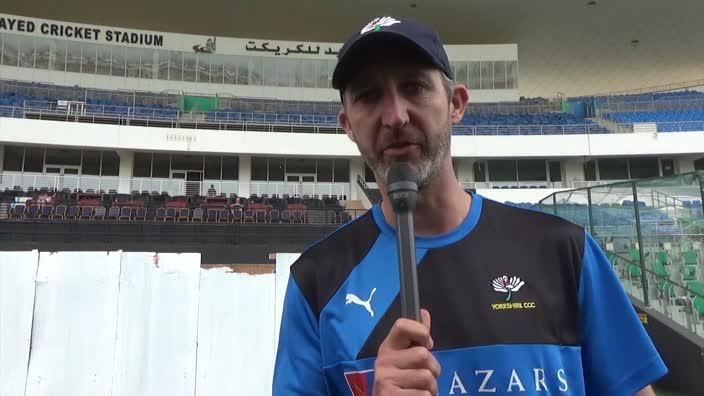
Winning droughts and losing streaks though are common in South Australian cricket. The state has not won the Sheffield Shield since 1996 when Gillespie was just a 20-year-old starting to make his way in the game. In the 25 years since SA last won, Queensland has won the Shield eight times, Victoria seven, NSW five, Tasmania three and WA twice. In that time SA has also failed to produce consistent national team players apart from Gillespie, who has a statue at Adelaide Oval to mark his achievements in the game. SA is the only state never to produce a player that has played 100 Tests for Australia.
From the outside, it’s easy to believe SA has cultural and systemic issues that start with the board of the South Australian Cricket Association and filter down through all levels of cricket.
Last year, former Australian batter Mike Hussey completed a review of SA cricket which found, in part, “that South Australian cricket has had a culture of mediocrity for many years and acceptance of it has been a barrier to success’’.
Gillespie agrees with Hussey’s finding, but goes even further. Gillespie believes there has been a “culture of entitlement’’ within South Australian cricket and its players. That there are too many players whose ambitions stop at being picked for the Redbacks.
“If your whole goal as a cricketer is to get one game for South Australia, well, you’re definitely not contributing,’’ he says.
But it also goes deeper than that. Gillespie says he has come across too many within cricket, players and officials, whose mindset is about what SA cricket can do for them, rather than the other way around.
“You get club cricketers saying ‘what’s the SACA going to do for me?’ And I want to turn that on its head. I’d love a player to come and go `What can I do for South Australian cricket, to help South Australian cricket improve?’.
“I think there’s a culture of entitlement, I’d use that term, there’s a culture of entitlement. ‘What are you going to do for me?’.’’

Gillespie stresses he doesn’t see that attitude in any of the current Redbacks squad but has noticed it even among parents.
“Parents who think their children are going to be super stars. They go: ‘What are you doing for my child?’ I’ll put the blowtorch back on that and say ‘No, what are you and what’s your child going to do for South Australian cricket?’.
“I want players who are desperate for success, desperate to play at the highest level, want to do everything they can to help South Australian cricket be the best.”
There are spots of rain falling on Park 25 as Gillespie talks while keeping an eye on the cricketers trying to impress him. It’s a cool, damp spring day, not a cricket sort of day at all, but Gillespie seems content in what could be the hardest cricket job in Australia beyond being the national team coach.
He’s living with wife Anna at Normanville and the duo have four kids together. He even still occasionally pulls the whites on and had a game with his 15-year-old son Jackson for Yankalilla and a basketball game with his younger son Brandon. He has ambitions to run a half marathon but hamstring and calf injuries are getting in the way. The ambition also remains to make sure he is not the last Indigenous male cricketer to represent Australia in Test matches. He believes the talent is there.
“You only have to look at what the AFL and the NRL and SANFL have done in Indigenous communities, with so many great Indigenous athletes coming out and playing those sports,’’ he says. “Have cricket been as proactive as other sports, maybe not, but I certainly see the effort being put in.’’
Still, Gillespie says Cricket Australia and the SACA have a lot of “great intentions’’ to engage with Indigenous communities but also notes “cricket is a different game’’.
Cricket is certainly more complex than footy. Games can last five days, pitches can be difficult to maintain, the equipment can be expensive.
Gillespie believes the rise of the shortened 20-over-a-side games could be key to enticing more interest. Indigenous cricketers Dan Christian and Darcy Short have played for Australia in T20 and one-day internationals.
Gillespie says he’s optimistic for the future. That one day he might get the chance to present another Indigenous cricketer with a Test cap.
And then he makes the obvious point.
“I’d love to see more Indigenous Australians playing for our country because it is our country,’’ he says, ending the sentence with a good-natured laugh.
Originally published as Jason Gillespie on Indigenous Test cricketers, Australia Day and the Redbacks




